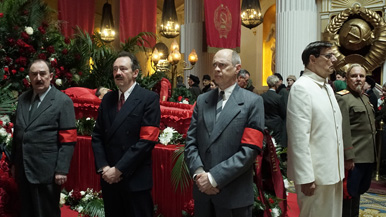Movie Review: The Death of Stalin
By Steven Slater
March 27, 2018
BoxOfficeProphets.com

Steve Buscemi is arguably the lead, playing Stalin’s advisor Khrushchev. He is one of a circle of influencers surrounding Stalin, including the sinister Minister of Security Beria, played with soft venom by Simon Russell Beale. Then there is the bumbling heir to the throne, of sorts,
Malenkov, played by Jeffrey Tambor. As you might imagine by his casting, almost everything revolving around his character is based around pure farce, as we see him awkwardly try to walk whatever line appears in front of his feet. The film, in essence, is about the power struggle between these three. It begins with Stalin alive and controlling things with the iron grip of fear, making sure everyone knows their name could be on tomorrow’s death list. His minions all grovel to his beck and whim, all while scheming for the most power and favor amongst their evil cabal.
Once Stalin dies they are all caught in an absurd race to do exactly what is right and expected, while trying to leap frog one another towards some imaginary finish line of absolute power. But since no one seems to have any idea which direction the race seems headed, they all just run into and trip over each other. Jeffrey Tambor is trying to appear dignified and regal, while having no idea what anyone is talking about. Steve Buscemi is actually trying to improve The USSR’s situation, but somehow only winds up directing Stalin’s funeral arrangements. Simon Russell Beale is doing by far the most scheming, but it only seems to get him tied in complicated knots of deceit. Meanwhile people like Stalin’s daughter keep showing up like bombs and blowing everyone’s carefully laid plans to smithereens.
There are a bunch of supporting characters who each provide wonderful moments of humor. Andrea Riseborough seems completely bonkers as the daughter of Stalin, and Jason Isaacs appears midway through as an off-the-walls army general, chest bulging with jingling medals. Many others weave in and out, and what is wonderful is how each of them has an integral role to play, and is given at least a few scenes to chew it up. The film moves between moments of real tension and terror, as it is not uncommon for people to be murdered every few minutes, and absurd moments of ridiculous hilarity. Oddly, this is a kind of reverse to Get Out; in that film the comic moments broke up the tension; here the tense moments break up the comedy. What is remarkable is how well it works, given that the tone can shift so violently, and even the performers sometimes are acting as if they are in completely different films. However, given how our current president acts, it begins to hit home that the farce is never far from the mark.
Add to that the great production design, the wonderful score, the cinematography, the acting, the writing, and direction, and it seems a shame that such a gem of a film will probably not be seen by very many people. The humor can be a little off-color, which may not work for everyone (there is a whole scene revolving around a puddle of urine), and sometimes the improvisational nature of the actors can threaten to steer things awry. But do not let the humor of the film misdirect you; this is a movie with a very important message, now more than ever, about how absurd and random humans are in the highest echelons of power. I would have been laughing more save for considering how similar events may yet take place in our near future.
Slatergrade: A